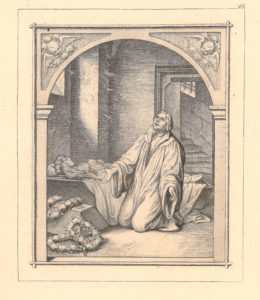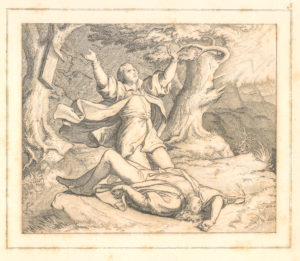by Rev. Matthew Zickler

In the life of a pastor, one of the highest concerns is to prepare those who are dying to be carried by the angels into the bosom of our loving God. As Lutherans, we give thanks to God that He promises to receive us, not because we are good enough, not because we have earned it, but because of the merit of Jesus’ blood shed for us and that merit alone. What a blessed promise that is, that upon our deaths our Lord will accept us in His Kingdom because He has loved us enough to redeem and save us!
But as a pastor, I find it also helpful to examine how those who have gone before me have cared for the dying. In light of the anniversary of the Reformation, it is all the more fitting to look at what Luther himself wrote to those approaching death.
In looking at such writings, we have letters that Luther wrote to his parents on their death beds. Luther, living in Wittenberg, was not able to be at the bedside of either parent, living in Mansfeld at that time, and the Reformer was disappointed by this. However, he saw his letters as a way to be present with them. As he said to his mother Margarethe, “I shall be with you in this letter, together with all the members of my family, and I shall assuredly not be absent from you in spirit.”[1] To his father Hans, he asks “forgiveness for [his] bodily absence,”[2] but notes that he is writing “that [he] might become a participant of [Hans’] faith, temptation, consolation, and thanks to God for His holy Word.”[3]
For both, when it came to more specific spiritual care, he encouraged them in the faith, commending them to Jesus Himself. To his father, Luther wrote, “I commend you to Him who loves you more than you love yourself. He has proved his love in taking your sins upon himself and paying for them with his blood as he tells you by the gospel. He has given you grace to believe by his Spirit, and has prepared and accomplished everything most surely, so that you need not care or fear anymore, but only keep your heart strong and reliant on his Word and faith.”[4] To his mother he remarked, “Dear mother, you know the real basis and foundation of your salvation, on which you must rest your confidence in this and all troubles, namely Jesus Christ, the cornerstone, who will not waiver or fail us, nor allow us to sink and perish, for he is the Saviour and is called the Saviour of all poor sinners, of all who face tribulation and death, of all who rely on him and call on his name.”[5]
What wonderful comfort! Here we can see the way that Luther directs them to the most important thing of all, or the most important One of all: Jesus. He directs them to the One who shed His blood for them, Who is our life and salvation, Who is the Savior of the world, coming not for the healthy, but sick, not for the righteous, but the unrighteous. What a blessed encouragement as one looks to the unknown of death: to see the One who has conquered even death itself.

König, Gustav Ferdinand Leopold. 1900. The life of Luther in forty-eight historical engravings. St. Louis: Concordia Publishing House.
In fact in looking further at what Luther wrote, another main theme for his writings to his parents in such distress is that victory of Jesus over death. Luther knew that the cause of our troubles, the cause of death, was sin in this world. He also knew that Jesus has overcome sin, that Jesus has overcome the world. He reminded his parents of this as well. To his mother he said, “[Jesus] says, ‘Be of good cheer; I have overcome the world. If he has overcome the world, surely he has overcome the prince of this world with all his power. And what is his power but death with which he has made us subject to him, captives on account of our sin? But now that death and sin are overcome, we may joyfully and cheerfully listen to the sweet words, ‘Be of good cheer; I have overcome the world.’ And we must not doubt that they are certainly true.”[6]
Yes, Jesus has overcome the world and the tyranny by which the evil one binds us. Again, what a comfort that is to hear. Likewise, notice that Luther quotes the Catechism, “This is most certainly true.” We need not doubt this. This is our faith; the faith entrusted to the saints and confessed in the Creed.
Luther says something similar to his father. To him he says, “We have yonder a true mediator with God, Jesus Christ, who has overcome death and sin for us and now sits in heaven with all his angels, looking down on us and awaiting us so that when we set out we need to have no fear or care lest we should sink and fall to the ground. He has such great power over sin and death that they cannot harm us, and he is so heartily true and kind that he cannot and will not forsake us, at least if we ask his help without doubting.”[7] Jesus has overcome the world and we need not have a care. Not only that, but also quoting the Catechism to his father, Luther pens these words: “Our departure from this life is a smaller thing to God than my journey would be to Mansfeld or yours from Mansfeld to Wittenberg. It is only an hour’s sleep, and after that all will be different. This is most certainly true.”[8]
Finally, Luther closed both letters with encouragement that he and the family were praying for them: “My Katie, little Hans, Magdalene, Aunt Lena, and all my household send you greetings and pray for you faithfully;”[9] and “All your children, and my Katie pray for you. Some weep. Others say when they eat, ‘Grandmother is very sick.’ God’s grace be with us all. Amen.”[10]
Learning from the wisdom of Luther, what can we draw in our own care for the dying? That we should be present as we are able and we should encourage them with the assurance that we are praying for them. All the more, we should point them to the promises of Jesus. We should point them to the One who has overcome even our sin and death itself, and in doing so has overcome the world and the devil. Likewise, we should point them to the promises that Jesus receives us by faith and faith alone. What a blessed assurance this is! Soli Deo Gloria!
The Rev. Matthew Zickler is pastor of Grace Lutheran Church, Western Springs, Ill.
[1] Luther, Martin, and Theodore G. Tappert. Letters of Spiritual Counsel. Philadelphia: Westminster Press, 1955. Print. The Library of Christian classics, v. 18; Library of Christian classics (Philadelphia, Pa.), v.18, 33.
[2] Ibid, 32.
[3] Ibid, 31.
[4] Ibid, 32.
[5] Ibid, 34.
[6] Ibid.
[7] Ibid, 31.
[8] Ibid, 32.
[9] Ibid, 32. Written to Hans.
[10] Ibid, 35.